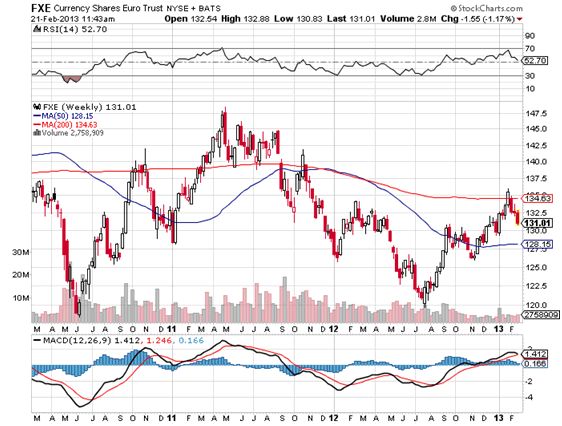New Economic Data Reveals More Bad News for the Eurozone
Economics / Euro-Zone Feb 25, 2013 - 06:12 PM GMT Sasha Cekerevac writes: One of the biggest detriments to global economic growth has been the weak eurozone region. Not only has economic growth been dismal within the eurozone area, but the level of financial instability over the past few years has left investors and businesses uncertain about the future.
Sasha Cekerevac writes: One of the biggest detriments to global economic growth has been the weak eurozone region. Not only has economic growth been dismal within the eurozone area, but the level of financial instability over the past few years has left investors and businesses uncertain about the future.
While there was some indication that economic growth might have been rebounding within the eurozone, new data point to a much weaker underlying economy than previously thought.
According to Markit Economics, which just published its Eurozone Purchasing Managers Index (PMI) for February, the situation amongst the region’s economies seems to be getting worse. The Flash Eurozone PMI Composite Output Index was 47.3 in February, down from 48.6 in January. Both the services and manufacturing PMI indexes also decreased for the eurozone. (Source: “Markit Flash Eurozone PMI,” Markit Economics web site, February 21, 2013.)
Even strong nations within the eurozone are experiencing a halt to any expansion in economic growth. The German PMI Composite Index was 52.7 in February, down from 54.4 in January. The U.S. PMI, meanwhile, showed a relatively strong manufacturing reading of 55.2 for February, down from 55.8 in January. (A number above 50 indicates economic growth; a number below 50 means economic contraction.)
This is an indication that the eurozone is far from generating strong economic growth. While many have hoped that strong nations, such as Germany, could pull up the rest of the eurozone into reasonably stable economic growth levels, it appears that the periphery eurozone nations might be bringing the stronger countries down.
For investors who have begun to dip their toes into eurozone investments, this appears to be a warning sign that economic growth is quite far away. In comparison, the U.S. reading of the PMI shows stable and relatively strong growth.
We will most likely see marginal investors in the eurozone sell some of their holdings and diversify into other regions around the world. Unless economic growth reignites within the eurozone, I think the euro currency will remain under pressure.

Chart courtesy of www.StockCharts.com
The weekly chart above is for the exchange-traded fund (ETF) that represents the euro. Note the weakness over the past couple of weeks, as feeble economic growth data are triggering a selloff in the eurozone currency.
I think we will continue to see a weak eurozone currency, especially with so much uncertainty regarding economic growth and politics. For example, Italy has an election coming up, which could throw any potential economic growth policies within the eurozone into doubt.
In addition to politics, significant structural issues for many eurozone countries remain. As economic growth stagnates, the unemployed become angry, and this causes more uncertainty in the political sphere. For now, I would avoid the euro and look for nations that have relatively improved possibilities for economic growth as a relative investment thesis.
By Sasha Cekerevac, BA
www.investmentcontrarians.com
Investment Contrarians is our daily financial e-letter dedicated to helping investors make money by going against the “herd mentality.”
About Author: Sasha Cekerevac, BA Economics with Finance specialization, is a Senior Editor at Lombardi Financial. He worked for CIBC World Markets for several years before moving to a top hedge fund, with assets under management of over $1.0 billion. He has comprehensive knowledge of institutional money flow; how the big funds analyze and execute their trades in the market. With a thorough understanding of both fundamental and technical subjects, Sasha offers a roadmap into how the markets really function and what to look for as an investor. His newsletters provide an experienced perspective on what the big funds are planning and how you can profit from it. He is the editor of several of Lombardi’s popular financial newsletters, including Payload Stocks and Pump & Dump Alert. See Sasha Cekerevac Article Archives
Copyright © 2013 Investment Contrarians - All Rights Reserved Disclaimer: The above is a matter of opinion provided for general information purposes only and is not intended as investment advice. Information and analysis above are derived from sources and utilising methods believed to be reliable, but we cannot accept responsibility for any losses you may incur as a result of this analysis. Individuals should consult with their personal financial advisors.
Investment Contrarians Archive |
© 2005-2022 http://www.MarketOracle.co.uk - The Market Oracle is a FREE Daily Financial Markets Analysis & Forecasting online publication.



